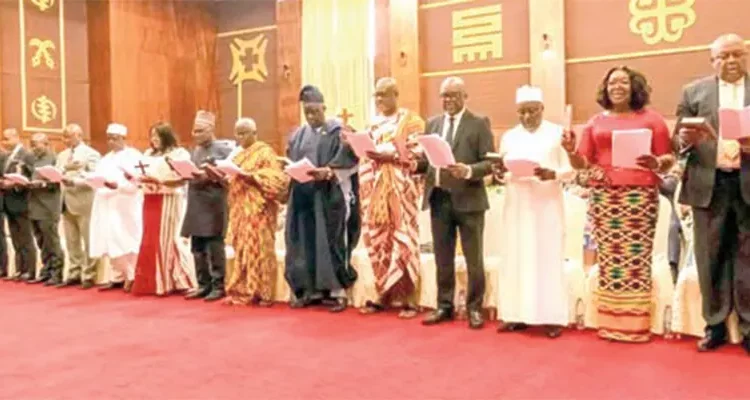The ambassadors taking their oath of office
President John Dramani Mahama has officially sworn-in 18 individuals as Ghana’s Ambassadors, High Commissioners, and Consul-Generals, urging them to serve with diligence and integrity in order to strengthen the nation’s diplomatic relations.
The ceremony, held yesterday at the Jubilee House, forms part of Ghana’s ongoing efforts to foster international cooperation and promote the nation’s interests abroad.
The list of appointees are Mr. Victor Emmanuel Smith, Ambassador, Washington D.C., USA; Ms. Mavis Ama Frimpong, Ambassador, Paris, France; Mr. Baba Jamal Mohammed Ahmed, High Commissioner, Abuja, Nigeria; Dr. Koma-Steem Jehu Appiah, Ambassador, Moscow, Russian Federation.
Others are Mr. Kojo Bonsu, Ambassador, Beijing, People’s Republic of China; Mrs. Sabah Zita Benson, High Commissioner, London, United Kingdom; Alhaji Hammed Rashid Tunde Ali, Ambassador, Abu Dhabi, United Arab Emirates; and Professor Ohene Adjei, Ambassador, Berlin, Federal Republic of Germany.
Alhaji Abdul Nasiru-Deen, Ambassador, Ankara, Turkey; Dr. Margaret Miewien Chebere, Ambassador, Copenhagen, Kingdom of Denmark; Mr. Labik Joseph Yaani, Ambassador, Malabo, Equatorial Guinea; and Nii Amasah Namoale, Ambassador, Brasilia, Federative Republic of Brazil.
The rest are Professor Kwasi Obiri-Danso, High Commissioner, New Delhi, India; Samuel Yao Kumah, Ambassador, New York, USA; Mr. Godwin Baletum Amonzem, Ambassador, Monrovia, Republic of Liberia; Mr. Aikins Abrokwa, Ambassador in-Situ, Director of State Protocol; Mr. Gustav Kwaku Sefe Dovlo, Ambassador in-Situ, Chief of Protocol; and Mrs. Patience Kokui Gameli-Kwame, Ambassador-at-Large, Deputy Director General, Research Department.
After administering the oath of office, President Mahama stated that the government’s ‘Reset Agenda’ represents a bold vision aimed at restoring hope and rebuilding trust among Ghanaians, with a focus on inclusive development.
He, however, emphasised that while significant efforts will be made locally to advance the government’s development agenda, the diplomats must also pursue strategic partnerships and unlock opportunities to elevate Ghana’s diplomatic relations as well as enhance the welfare of Ghanaians living abroad.
By Ebenezer K. Amponsah


